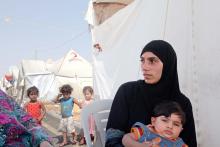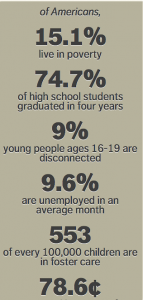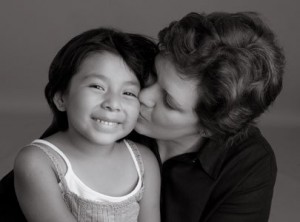Mothers

COVID-19 amplifies a tenuous holiday, especially among people of faith.

The liturgy for this Mother’s Day is unintentionally perfect. It’s from John, the part where Jesus is praying for his dear friends at the last supper.
What does he pray for them to be? Great preachers? Saintly saints? Perfect people? Nope. He prays that they will be one – one with each other, one with God.

LAST NOVEMBER, when my daughter turned 2 weeks old, I returned to full-time work. Five days after her birth I was on email. Within a week I was taking work calls. I wasn’t a workaholic. I was a new mom without paid family leave.
Several years earlier, when I was single and singularly focused on my career, I’d been hired as a contractor for the United Methodist Church to direct a grassroots campaign on maternal health. I never stopped to consider what effect my employment status might have if I decided to have a child of my own. When my husband and I got pregnant, I faced the stark reality that there were no policies in place to protect or support me.
Sadly, my experience is commonplace. A recent report revealed that one in four U.S. women return to work within two weeks of giving birth. While the Family and Medical Leave Act (FMLA) protects employees’ jobs for up to 12 weeks after the birth or adoption of a child, only about 60 percent of U.S. workers meet the eligibility requirements, including only 19 percent of new moms. And since the FMLA does not require employers to provide paid leave, those who are eligible and need time off do not always take it because they cannot afford the loss of income.
With no federal paid-family-leave program and only a handful of states with their own, churches and other employers that do provide paid parental leave are left to foot the bill for it. Oftentimes they offer this benefit exclusively to their highest earners. The United Methodist Church, for example, does have a national parental-leave policy of up to 12 paid weeks, but it is only available to pastors. Staff of the denomination’s agencies, such as the one I work for, are offered up to 18 days of paid leave, after which they must use accumulated vacation or sick days or take unpaid leave. But as a lay person and a contractor, I was not eligible for either policy.

We think it's wrong for a woman, much less a mother, to be angry. And so when anger inevitably, righteously, hits us — with its cousin fatigue and its brother frustration — we don't know what to do except to bury it beneath a smile that gets thinner and weaker as the day winds on.
We all get angry, though. It is a function of being human, and I daresay without anger we would never have won women the right to vote, school desegregation, or any other host of advances that came about when people got righteously angry and unleashed the power of justice and the Holy Spirit.
So be angry when you are angry. The Bible says so. Do not be ashamed to say, in the moment, "This is not right. I'm angry."

There’s a photo he carries for long journeys
like this one, for trips on loaded market lorries
where the passengers take their seat, perching
on top of cargo, or sitting on crude benches
inside the buses coming from Sudan with names
like “Best of Luck” or “Mr. Good Looking.”

Religious identity used to be “inherited.” “Cradle Catholic” is shorthand for born into the faith; within Judaism, the faith is passed through a Jewish mother to her children unless they grow up to proclaim a different religion.
But children don’t just inherit parents’ spirituality, says psychologist Lisa Miller in her new book, The Spiritual Child. She writes that the essential sense of a transcendent power in the world — one that will love, guide, and accept them and wrap them in a protective layer of self-worth -– has to be nurtured.

Men and boys of color are 21 times more likely to be fatally shot by the police than their white counterparts. Of the 1,217 deadly police shootings that occurred from 2010-2012, men of color between the ages of 15 to 19 were killed at a rate of 31.17 per million, while the rate for white males the same age was only 1.47 per million.
This pattern is not new. It is old and repetitive. And it is sickening.

I wish I could sit beside you on a cushion on the floor and have a cup of tea with you. I would like to snuggle your baby in my arms. I would like to hear your story. I know you have a sad story, and if I heard it, I would weep.
I know you are good and loving women. I’m sorry you have lost so much. I’m sorry you had to come to a country, a city, and a house that is not yours.
I can imagine you in your own country, strong women serving others. I can imagine you making beautiful food and sharing it with your family and friends. I can imagine you caring for your mothers and daughters, fathers and sons, sisters and brothers and friends. Just the way I do.
Because that’s what women do. We are compassionate. We give. We serve. We protect. We work hard to make the world better for the people we love.
Wherever I go in the world, I discover that we women are very much alike. We may have different clothes. Different languages. Different cultures. Maybe our skin is a different color. But in our hearts, we are the same.
That’s why we can look into each other’s eyes and feel connected. We can talk without using words. We can smile. We can hug. We can laugh.
And sometimes, we can feel each other’s pain. I have prayed that God would help me feel your pain. I wish I could remove your pain. I wish I could help you carry it.

Women do a lot of work: Moms, grandmothers, aunties, sisters, daughters, wives, teachers, coaches, and any additional caregiving, mentoring position that fills in our lives. Take a moment to pause and reflect on the number of women who have helped you become the person you are today.
In the latest Shriver Report, NBA star LeBron James writes a meaningful tribute to his mother, Gloria, honoring her dedication as a parent and the sacrifices she made in raising her son as a young single mom. Because Gloria was just 16 years old when LeBron was born, they lived with his grandmother. When Gloria’s mother passed away three years later, she and her young son were on their own.
Still a teenager, Gloria did not have the support, education, or resources to sustain her family. The house was lost, and she and her son moved around frequently — a dozen times in three years — counts LeBron.
He writes that “My mom worked anywhere and everywhere, trying to make ends meet. But through all of that, I knew one thing for sure: I had my mother to blanket me and to give me security. She was my mother, my father, my everything. She put me first. I knew that no matter what happened, nothing and nobody was more important to her than I was. I went without a lot of things, but never for one second did I feel unimportant or unloved.”
In effort to model Gloria’s example of devotion, LeBron now takes an active role by helping other kids of single-parent homes through the LeBron James Family Foundation and the Boys & Girls Clubs of America.
“The truth is that everything I’ve learned about being a parent to my boys … I learned from my mother,” he writes in his letter of appreciation to her. “Everything I know about being loving and caring, and sacrificing and showing up and being present in my children’s lives—I learned all of that from her example.”
Without his mother’s influence, would LeBron be the same LeBron?

The stories pastors, chaplains, and charity workers too often hear behind closed doors and through frustrated tears are being brought to light. Acting Secretary of the United States Department of Labor Seth Harris has hit the road to listen to people struggling to get by on the minimum wage.
Courageous people are publicly coming forward to tell their stories of personal pain, indignity, and frustration in the interest of creating the will to increase the federal minimum wage from $7.25 an hour to $9.00 an hour by 2015.
ON A MILD morning in July 1997, a group of women gathered under the spreading arms of a great neem tree in the village of Malicounda Bambara in Senegal, West Africa. While children played nearby and others rested on their mothers' laps, a woman named Maimouna Traore spoke to the group.
Like most women in Malicounda Bambara, Traore had never gone to school as a child. Opportunities for education in villages like hers were scarce, especially for girls. But one year earlier, a program called Tostan (the word means "breakthrough" in the local Wolof language) had come to her village. The women enrolled in the Tostan program met three times a week, engaging in lessons on literacy and math, health and hygiene, problem-solving—and, most important of all, human rights.
Addressing her words to Molly Melching, Tostan's founder and the one American present among them, Traore said that, before the program, women in her community did not understand human rights. They did not know that, like men, they have the right to health and well-being, to speak their minds and offer their opinions. With their new understanding of these concepts came courage. They invited Melching because, after much thought and discussion, they had made an important collective decision: to end the practice of female genital cutting (FGC) in their community.
Melching was speechless. Rarely discussed openly, FGC, the complete or partial removal of female genitalia for non-medical reasons, is a long-held and deeply entrenched custom in many villages of Senegal, as well as in 27 other African nations. Known locally as "the women's tradition," it has been regarded as among the most critical moments in a girl's life, preparing her for marriage and making her a respected member of her community. To not cut one's daughter was unthinkable—setting her up for a lifetime of rejection and social isolation.
This Sunday is Mother’s Day. Here at Sojourners, we’re taking the entire week to celebrate not only mothers, but all women who have made an impact on our lives. For their strength, heroism, charity and wisdom, we honor them.

There is a beautiful story that some Christians have learned to tell about motherhood. This story is one of strength, faith, sacrifice, loss, and unconditional love.
Our Biblical mothers, from Eve to Mary and everyone in between (Sarah, Leah, Rachel, Jochebed (the mother of Moses), Bathsheba, Hannah, and Elizabeth to name a few) provide examples of women who defied societal constraints to protect their children; who gave them up so that their children might prosper; who supported, loved and nurtured their sons absolutely, without the expectation that that same love would be returned to them.
In Mary’s story we are called to appreciate the mother who shepherded truth and salvation into the world, whose faith made our faith possible today. The Christian story of motherhood is one I am proud to tell and one I hope to live into one day.
On Mother’s Day, we have the opportunity to reflect on the gifts of motherhood, to lift up the mother’s among us and recognize their strengths, sacrifices, and wisdom--what a beautiful idea. But the problem, in our society, is that one day of cards and flowers just doesn’t cut it. For most of the other 364 days of the year, the lives of women and mothers are undervalued.


With Mother’s Day just around the corner, I’ve been thinking about the matriarchal blessing—the moment when an old woman, staring death in the eye, communicates to a younger female relative or friend that life is good and love is eternal.
As far as I know, the only mention in the Bible of an older woman blessing a younger woman is when Elizabeth says to her young, unwed, pregnant relative Mary: “Blessed are you among women, and blessed is the fruit of your womb” (Luke 1:42). Elizabeth probably wasn’t the matriarch of her family, and she wasn’t about to die, but her Spirit-inspired words were still similar to a matriarchal blessing. She welcomed the new life growing in Mary, and her loving hospitality surely must have given courage to the baffled young mother-to-be.


Sharing stories of my own mother and the ways she taught and encouraged me feels like the best way to honor her on Mother's Day. To this day when I am thinking of expressing an uncharitable thought I can hear her voice “If you don't have anything nice to say, don't say anything.”
Although this may sound like a cliché, it is a teaching that I am relearning once again in a class called “Wisdom of the Desert” and finding that my mother's sensibilities had many similarities to that of the early Christian Desert Fathers and Mothers. Gratitude and hospitality, two huge teachings of the desert monks, were also lessons I learned from my mother.


Perhaps the most important finding from the report is that we have both the experience and the policy tools necessary to cut poverty in half.
Between 1964 and 1973, under both Democratic and Republican administrations, the U.S. poverty rate fell by nearly half (43 percent) as a strong economy and effective public policy initiatives expanded the middle class.
Similarly, between 1993 and 2000, shared economic growth combined with policy interventions such as an enhanced earned income tax credit and minimum wage increase worked together to cut child poverty from 23 percent to 16 percent.
We can't do this alone.
 Could my mission really be confined to seeking the best for the children to whom I gave birth? Or, as a Christian, should I define "family" more broadly? I'd see images of women and children suffering around the world, and those puzzling verses returned to my mind. Maybe, instead of obsessing over the happiness of my babies, I should stick my head out of the window, so to speak, look around, and ask, "Who is my family?"
Could my mission really be confined to seeking the best for the children to whom I gave birth? Or, as a Christian, should I define "family" more broadly? I'd see images of women and children suffering around the world, and those puzzling verses returned to my mind. Maybe, instead of obsessing over the happiness of my babies, I should stick my head out of the window, so to speak, look around, and ask, "Who is my family?"
It didn't feel right to simply shrug my shoulders and blithely accept my good fortune as compared to that of people born into extreme poverty. I'd buy my kids their new school clothes and shoes and then think of mothers who did not have the resources to provide their children with even one meal a day. I'd wonder: what's the connection between us? Does the fact that $10 malaria nets in African countries save whole families have anything to do with my family buying a new flat-screen TV? Should it? Is there any connection between me, a suburban, middle class mom, and women around the world?
I hate war. I do not hate it because people die. Death is inescapable. And believers believe that we will meet those we love again in heaven. I hate war with a perfect hatred because it causes suffering and robs the world of incalculable human possibilities. It pains the earth. It creates waste and the misallocation of resources.
Saturday, August 6, 30 Americans and eight Afghans were killed when Taliban insurgents shot down a Chinook transport helicopter. The New York Times called it: "the deadliest day for American forces in the nearly decade-long war in Afghanistan."
The debate we have just witnessed has shown Washington, D.C. not just to be broken, but corrupt. The American people are disgusted watching politicians play political chicken with the nation's economy and future. In such a bitter and unprincipled atmosphere, whoever has the political clout to enforce their self-interest and retain their privileges wins the battles. But there are two casualties in such political warfare: the common good and the most vulnerable.
So how will vulnerable people fair under this deal? "The Circle of Protection," a diverse nonpartisan movement of Christian leaders, has been deeply engaged in the budget debate to uphold the principle that low-income people should be protected. But it is hard to evaluate a deal that averts a crisis when the crisis wasn't necessary in the first place. Over the past few weeks, our economy has indeed been held hostage as politicians negotiated the price of the release. Ultimately, I think most of us wish that no hostages had been taken in the first place, and this was no way to run a government or make important budget decisions.